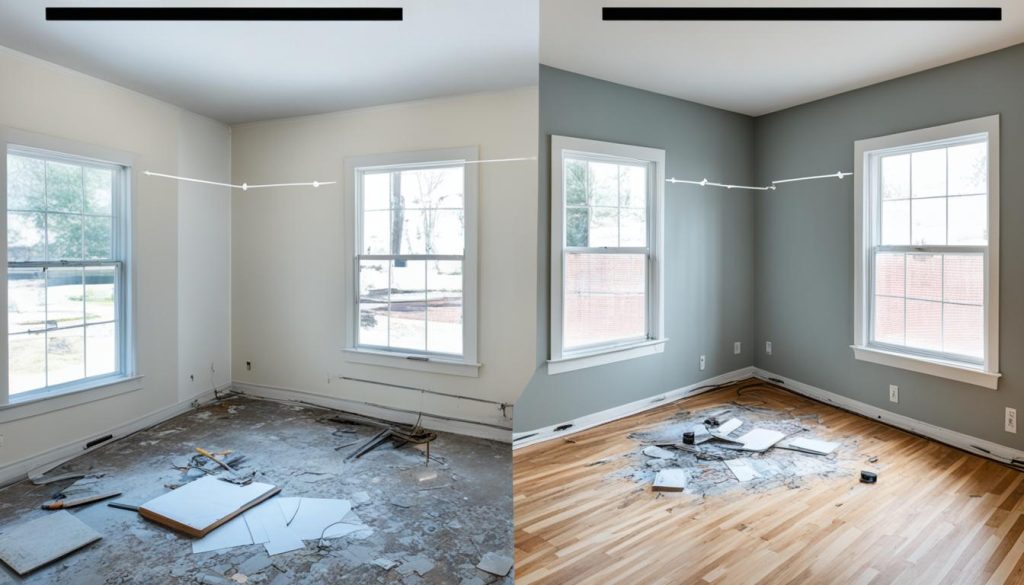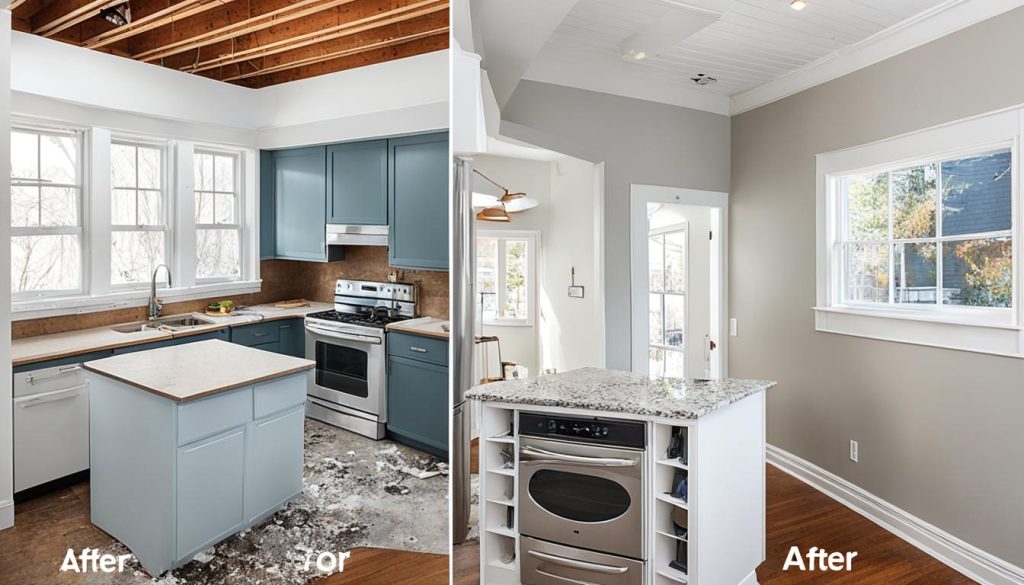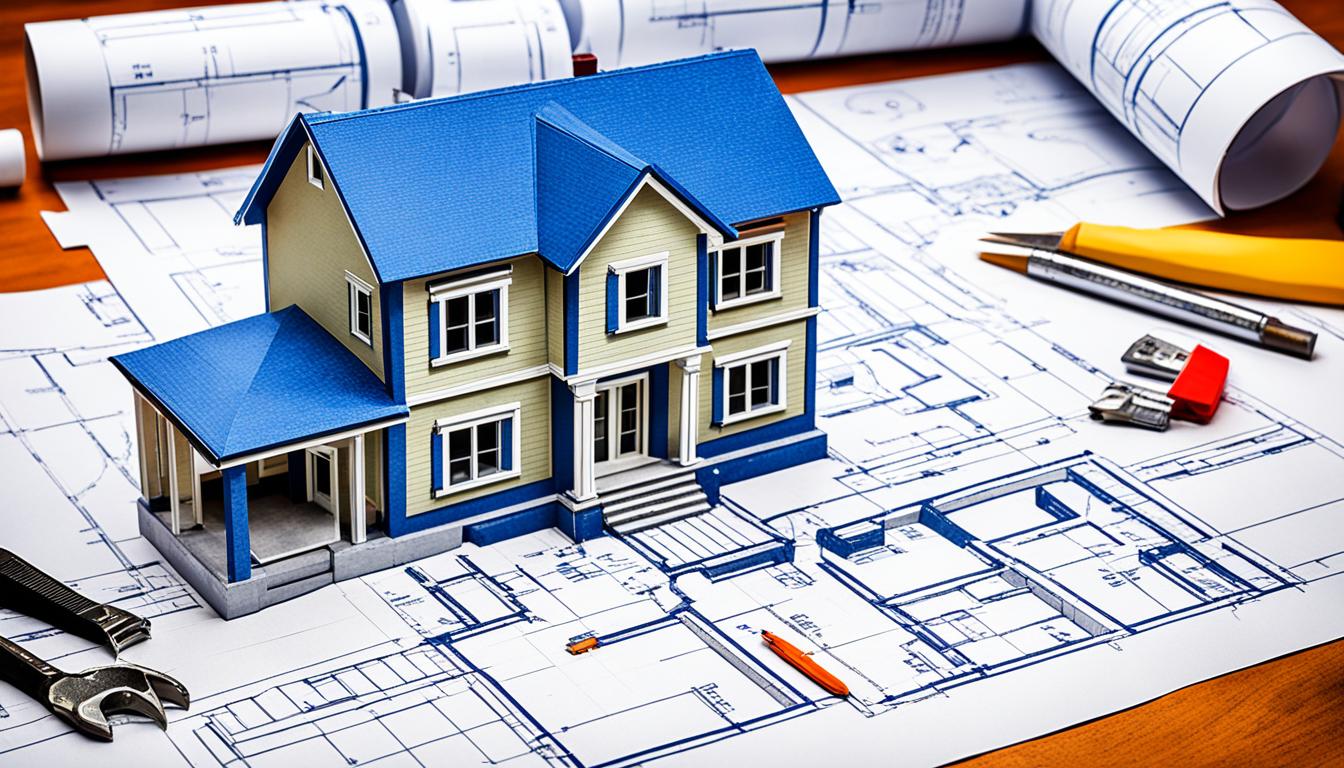Did you know that the average home renovation cost in Canada is approximately $49,979? That’s a significant investment, and it’s crucial to plan your budget carefully to ensure a successful renovation project.
Whether you’re considering a bathroom makeover, kitchen renovation, or transforming your living room, it’s essential to have a clear understanding of the costs involved. By creating a detailed plan and conducting thorough research, you can develop a realistic and manageable home renovation budget.
Key Takeaways:
- The average home renovation cost in Canada is approximately $49,979.
- Create a detailed plan and conduct research to develop a reasonable home renovation budget.
- Consider the value of your home and avoid spending more than 10 to 15 percent of its value on a single room renovation.
- Older homes often require more extensive renovations and may cost more than newer ones.
- Proper budgeting will help ensure a successful and stress-free renovation project.
Average Cost to Renovate Different Rooms
The average cost to renovate different rooms can vary. According to HomeAdvisor, here are the average costs for some common room renovations in Canada:
| Room | Average Cost |
|---|---|
| Bathroom | $10,000 – $25,000 |
| Kitchen | $20,000 – $50,000 |
| Living Room | $5,000 – $15,000 |
How to Estimate Your Home Renovation Costs
Estimating your home renovation costs is essential to create a realistic budget. By considering the value of your home, using online tools, and calculating the cost per square foot, you can get a better understanding of how much your renovations may cost. Additionally, exploring different financing options can help you fund your home renovation project.
When estimating your home renovation costs, start by taking into account the value of your home as a whole. As a general guideline, it is recommended to spend no more than 10 to 15 percent of your home’s value on a single room renovation. This ensures that your investment aligns with the overall worth of your property.
Another helpful resource is utilizing home renovation cost estimator tools available online. These tools provide estimates based on the project type, size, and location. While they offer rough estimations, they can give you a starting point to help you plan and budget accordingly.
To further calculate the cost per square foot, divide the total cost of the renovation by the square footage of the area being renovated. This calculation can provide you with a benchmark to compare costs and make informed decisions about your home renovation.
Financing is an integral part of any home renovation project. Popular options for financing your home renovation include home equity loans or lines of credit, cash-out refinancing, and personal loans. Each option has its own advantages and considerations, so carefully explore them to choose one that aligns with your financial situation and goals.

Estimating your home renovation costs, using tools to calculate costs, and exploring financing options will help you plan your budget effectively and ensure a successful renovation project that meets your needs and expectations.
Tips for Saving on House Renovation Costs
When it comes to house renovation costs, finding ways to save money is always a priority. Here are some valuable tips to help you cut costs, embrace the DIY spirit, and make smart choices when shopping for materials:
- Take on DIY Projects: One of the most effective ways to save on renovation costs is by tackling certain tasks yourself. Consider doing the demolition work or painting on your own to reduce labor expenses. Don’t underestimate your abilities – with some research and a little practice, you can successfully complete many renovation tasks.
- Shop for Materials Yourself: Instead of relying solely on contractors to supply fixtures, finishes, and materials, take the initiative to do some shopping on your own. This way, you can avoid additional fees often charged by contractors for purchasing and transporting materials. By personally sourcing the items you need, you can find budget-friendly options that fit your design aesthetic.
- Consider Used or Refurbished Items: Saving money on appliances and finishes is possible by considering used or refurbished items. While they may require a bit of extra effort to find, these items can be a great way to cut costs without compromising on quality. Explore local classifieds, online marketplaces, and salvage yards for hidden gems.
- Be Your Own Project Manager: By taking on the role of project manager, you can hire subcontractors directly, eliminating the need for a general contractor and potentially reducing costs. Managing the project yourself allows you to oversee the renovation process, coordinate schedules, and ensure that work is being completed efficiently and within budget.

Implementing these money-saving tips can make a significant difference in your overall renovation budget. Remember, even small savings can add up and help you stay within your financial limits.
| Tip | Benefit |
|---|---|
| Take on DIY projects | Saves on labor costs |
| Shop for materials yourself | Avoid additional contractor fees |
| Consider used or refurbished items | Save money on appliances and finishes |
| Be your own project manager | Eliminate general contractor fees |
Prioritizing Your Home Renovation Projects
When it comes to home renovation, prioritizing your projects is key. You want to focus on urgent repairs, renovations that add value to your home, and aesthetic improvements that enhance your living space. By carefully considering these factors, you can make informed decisions about where to allocate your time and budget.
Urgent renovations should take precedence. These are the repairs and improvements that directly impact the comfort and longevity of your home. Is your insulation inadequate? Do you have a leaky roof or poor ventilation? Addressing these issues first will ensure a safe and secure living environment for you and your family.
Renovations that add value to your home should also be a priority. Upgrading your kitchen, renovating the bathroom, repainting the interior and exterior, updating the decor, and decluttering the space can significantly increase the resale potential of your property. These projects not only make your home more appealing to potential buyers but also enhance your everyday living experience.
Once urgent repairs and value-adding renovations have been addressed, you can consider aesthetic improvements. Redecorating, adding decorative elements, and personalizing your space can bring a sense of joy and satisfaction to your home. These projects may not be crucial in terms of functionality but can greatly enhance the overall ambiance and reflect your personal style.
Remember, it’s important to budget accordingly for each priority. Allocating your resources effectively will ensure you achieve both the necessary repairs and the improvements that add value and aesthetic appeal. By carefully prioritizing your home renovation projects, you can create a space that is not only beautiful but also functional and comfortable.

Leave a Reply
You must be logged in to post a comment.